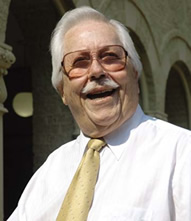| Prof analyzes presidential election | Randy Snow joins Olympic Hall | Distinguished alumni named |
 |
||
| Home Forethought Campus Buzz Feature Stories Re:Search The Score Alum News Yesteryear | ||
Emory Estes recites Thoreau. Name-drops Faulkner, stopping short of calling him Billy. Idealizes Poe, internalizes Steinbeck.
This is what's in his mind.
His real life? It's the novel you can't put down.
 Dr. Estes married the first coed he met at East Texas Baptist University, a "perfectly snooty-looking woman with her hair all up to here" whom he asked for directions. He was a paperboy in the Depression and a paratrooper who served with MacArthur in the Pacific. He has kept the same fishing buddies since the Shakespeare administration.
Dr. Estes married the first coed he met at East Texas Baptist University, a "perfectly snooty-looking woman with her hair all up to here" whom he asked for directions. He was a paperboy in the Depression and a paratrooper who served with MacArthur in the Pacific. He has kept the same fishing buddies since the Shakespeare administration.
"People say I'm purely romantic," he said. "And I don't mind that."
Now the main character rides off into the sunset.
Estes, 79, began a semiretirement Aug. 31, phasing himself away from the school he's been a part of since 1956. He will return to teach literature in spring 2005, spring 2006 and--at age 82--spring 2007 before he's done for good. Twice during his career, he accepted positions at other universities but came back a few weeks, or days, later because he "was hungry for this place."
"I loved it the first time I stepped on campus," he said. "It just felt right to be here. It was purely metaphysical."
So he stayed. Through an institutional name change. Two system alliances. Seven presidents. His wife, Dorothy, joined him at UTA in 1970 and served 26 years as the director of Student Publications. With a major urban university growing around him, Estes taught classes in "an old wooden building, and a two-story house, and a building where the roof leaked."
"Preston Hall was so bad then, even rats wouldn't go in there," he said. "But it never distracted the students one darn bit. If we needed to teach in a third-floor restroom, we would have. That's how bad we needed the space."
The University has changed, but in many ways Estes hasn't. And if some students had their way, he never would. When he announced his retirement, one class begged him to reconsider. Students in another signed a petition demanding that he stay.
Students love him because they've always been his motivation. He greets them every class with "Good morning, scholars!" He has been nominated for nearly every UTA and U.T. System teaching award, and he's taught classes on three continents. Grateful graduates return to his tiny fourth-floor Carlisle Hall office like Chaucer's pilgrims.
The stories they tell.
One endured a Vietnamese prison camp by reciting poetry Estes taught him. Others have said he was an inspiration, the reason they became teachers. English Department Interim Chair Wendy Faris said Estes' student-evaluation reviews usually include variations on the line, "He treats us just like his children, and we love it."
Whatever, he's glad to hear it.
"You have to love students before you can teach them. And I have loved them. "It doesn't matter if it's one or 20, because I don't teach numbers. I teach students, and every one is important. I teach them as if they're my own children. I've been accused of being too attached to my students, and it's probably true."
Books were Estes' first love. He can read them in four languages. One props open his office door (although a big rubber stopper sits nearby). They've been literally a lifesaver.
A heart attack nearly killed him in the early 1980s, a result of stress, he said. He was English Department chairman and had spearheaded the creation of a Ph.D. program and a rhetoric discipline, plus there were the sometimes onerous management duties of the job. At home cleaning his pool and eating "a Dagwood Bumstead sandwich," he felt a pain in his chest that doctors first considered minor.
But it wasn't minor at all. For several months, the doctors weren't certain Estes would live. Unable to speak, he scrawled messages to his nurses on sticky notes--always punctuating them perfectly. He couldn't read or watch television, so he began reciting books he'd read, beginning with novels from his childhood.
"The only thing in my room was a clock," he said. "I'd just watch it go around and around. "Well, I was going to make sure this never happened again."
Once healthy, Estes stepped down as chairman but continued as a full professor and member of several committees. He was determined to continue what his early colleagues--Duncan Robinson, E.H. Hereford and E.C. Barksdale--had started.
"These men had the vision, you know. Sometimes I still see them walking on campus or talking in meetings. The words have changed, but the message is the same. UTA is a good place to get a good education."
And for Emory Estes, a good place to work. For 50 years.
Dr. Faris has asked him to provide some information on the history of the department because "when he goes, we'll lose some of that-we don't want to lose that."
It shouldn't be much work for Estes to jot down his thoughts. He wrote much of the history firsthand.
"It's been a marvelous experience," he said. "I'm glad I did it, I'm glad I stayed, and I'm glad there are people who will still be here 48 years from now. "The University is going to survive. The University is in pretty good hands. And the students will always be here."
And in a way, so will he.
— Danny Woodward
| Archives
| Alumni Association |
Giving to UTA | UTA
Home Copyright © 2004 UTA Magazine. All rights reserved. |